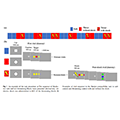Abstract
The congruency sequence effect (CSE) refers to the reduced distractor interference following conflict trials compared to following non-conflict trials. According to the affective account, the enhancement of cognitive control necessary to resolve the negative affect caused by conflict drives the CSE. Research supporting this view has shown that the induction of negative affect leads to increases in the CSE. In contrast, the dual competition model predicts that the processing of task-irrelevant high-threatening stimuli consumes the resources required for cognitive control, reducing the CSE. To test the impact of threat on the CSE, the present study examined the modulation of the CSE in the threatening context induced by electric shocks. Participants were to perform two Simon tasks or two flanker-compatibility tasks both under threat of shock and without such threat. Consistent with the dual competition model, the CSE obtained in the safe context disappeared under the threat of shock, regardless of whether participants performed stimulus-based conflict tasks or response-based conflict tasks. This paper discusses the implications of this finding in relation to the CSE’s driving motivation, aiming to reconcile these discrepant results with previous findings supporting the affective account.
